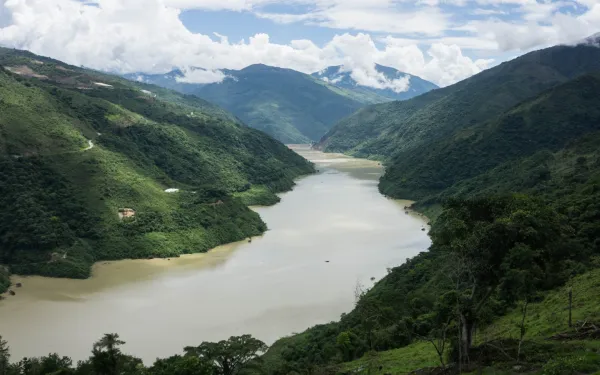
Human Rights
Human Rights

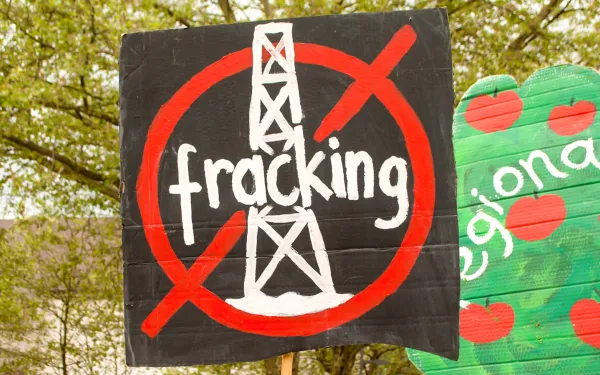
Why fracking is not an energy transition
The current global health crisis is forcing society to reflect on our ever increasing need for change. It’s putting us face-to-face with the fragility and unfeasibility of an energy system based on fossil fuels. This is evidenced by the historic collapse of oil prices associated with lower international demand for hydrocarbons—due to measures adopted in response to the pandemic—as well as overproduction and speculation in oil contracts, among other factors. Demand for gas is also expected to fall by 5 percent, following a decade of uninterrupted growth. Latin America is highly dependent on fossil fuels, both as an export commodity and for its own domestic consumption—88 percent of the energy used on the continent comes from nonrenewable resources. Since 2010, governments and private businesses have been pushing for fracking, or hydraulic fracturing of unconventional deposits, due in large part to the overexploitation of conventional hydrocarbons. Some countries describe fracking as a ‘bridge’ to reducing dependence on coal and petroleum as energy sources, claiming it gives them time to develop alternatives to fossil fuels. Following this logic, fracking has been promoted as a step toward energy transition. But how can a process that demonstrates a clear lack of economic, environmental, and social viability be labeled a transition? Reasons to say “No!” to fracking To resort to fracking is to continue to promote an energy system characterized by high private ownership and appropriation, the use of non-renewable resources, and negative impacts on affected populations and territories. What’s more, this system is defined by a great inequity in terms of access to, and use of, energy. Hydraulic fracturing involves the injection of toxic substances into the subsoil, which can cause the contamination of aquifers and air due to the volatility of some compounds. What’s more, leaks in the production and transport of gas and oil extracted vía fracking have been related to the increase in global emissions of methane, a pollutant responsible for about a quarter of all global warming. The technique also requires large amounts of water, which is especially relevant in a region that continues to confront serious problems concerning access to this basic resource. The use of fracking affects the ways of life of communities, both in terms of health—due to toxic substances in the air, water and soil—and in the violation of human rights and democracy. Many communities, particularly indigenous ones, lack access to information and are not properly consulted on fracking projects in their territories. The damages may be more serious for women, aggravating previously existing structural inequities. In economic terms, hydraulic fracturing requires large investments and, in order to be viable, it needs a market with high prices. In that sense, the unpredictability of oil prices makes it so that any nation that depends on hydrocarbons for its energy sovereignty is taking a dubious risk. Also, in fracking the rate of return on energy is lower. This means that the extraction process demands much more energy that it can capture. All this results in an energy benefit that is sometimes non-existent, and in which profits come from financial speculation. To promote fracking today would be to take a step backward, rather than forward. It simply does not meet the definition of a transition away from fossil fuels, and the logic of fracking has little to do with satisfying the social and economic needs of the people, among them environmental sustainability. A Movement for Change A growing number of organizations, institutions, communities and individuals throughout the Americas have organized to prevent the advance of fracking. These joint efforts, like the Latin American Alliance On Fracking, promote access to information and dismantle the position of businessmen and governments that claim fracking and more extractive activities are the only way out. Initiatives have emerged that seek energy alternatives by promoting dialogue and creating working groups on a just transition. Examples range from the experience of energy autonomy through small community hydroelectric plants in Guatemala, the Rio Negro Production and Energy Transition Working Group in Argentina, and the various experiences of Censat Agua Viva in Colombia, including a Social Working Group for a New Mining, Energy and Environmental Model. Meanwhile, using legal and administrative mechanisms, several municipalities and communities in Argentina, Mexico, Brazil and Uruguay have prohibited or declared a moratorium on fracking in their territories. Thinking about another society requires thinking about another energy system, one that is just and democratic. These spaces of resistance and the construction of alternatives give us a roadmap to promote structural changes and to jointly confront our society’s health, economic, and climate crises. Only then can we move beyond a system in which what was once considered "normal" simply wasn’t working.
Read more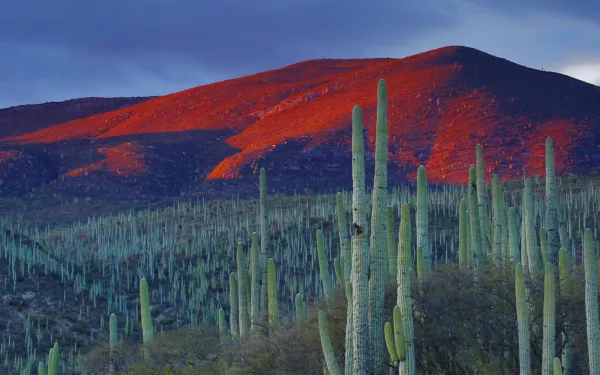
Challenges and conditions to advance towards energy justice in Mexico
This blog entry accompanies the launch of the first ever Benchmark on Renewable Energy and Human Rights. It was originally published by the Business & Human Rights Information Centre. By Rosa Peña Lizarazo and Astrid Puentes Riaño The climate crisis, in the words of Michelle Bachelet, the UN High Commissioner for Human Rights, is the greatest current threat to human rights, and one that requires urgent political decisions and collective action. One such decision concerns progress in the energy transition, that is, the shift from the use of energy derived from fossil fuels to the use of energy that is renewable and less emission-intensive. By reducing greenhouse gas emissions, this transition would help to address the climate crisis and improve air quality. In Mexico, this transition has motivated multi-sector debates and requires a participatory, inclusive, and transparent dialogue with a human rights approach and a territorial perspective. There are four main challenges to this: main challenges 1. The socioeconomic context Mexico has some of the highest levels of inequality on the planet, with ten of the country’s richest people holding wealth the equivalent to 50% of its poorest. Understanding this context is key to adapting energy transition policies that meet international climate obligations without creating more inequity. It is also essential to learn from the past. The 2013 energy reform set in motion a model for the massive implementation of renewable energy projects, both large-scale and private. This made it impossible to overcome the wide gaps in exclusion for socio-economic and territorial reasons. 2. Energy consensus Another challenge is achieving regulatory and social consensus on what clean and renewable energy is and what the goal should be in its implementation. Despite the proposals of some environmental organizations, the Mexican Government accepted vague and more convenient definitions to fulfill its climate commitments. It defined clean energies as those that do not generate polluting emissions during their production, ignoring whether they can generate other negative impacts on the environment. 3. Respect and protection of human rights The generation of energy from fossil fuels has violated human rights, provoking scenarios of exclusion and serious implications for Mexico’s indigenous and rural communities. Likewise, many non-conventional renewable energy projects, like those developments in the Isthmus of Tehuantepec or in the Yucatan Peninsula, have generated new socio-environmental conflicts. These relate to the lack of transparency and participation, violation of the rights of native peoples, lack of knowledge of traditional ownership and uses of land, obstacles to access natural resources, and environmental degradation. It is therefore a challenge to undertake a transition that considers and prevents these harms from a human rights perspective. 4. Energy diversification and reliability Given current dependence on fossil fuels in the energy grid - which by 2018 generated 75.88% of the country's energy - progress towards mitigation and adaptation to climate change requires a process of diversification of energy sources that takes advantage of Mexico's potential to develop renewable energy. Another associated challenge is to guarantee the reliability of the system to ensure it can continuously meet the country's energy demand. how can a fair transition come about? At AIDA, we believe this can be done by building energy justice in Mexico, through the following: Adapting to the socioeconomic context: Betting on a transition that becomes an engine of local development, through for example, the generation of jobs, the democratization of energy and energy generation in the scale necessary for self-supply. This requires overcoming existing barriers to exclusion by implementing, for example, community energy projects. Designing participatory energy policy: Propose scenarios of effective and inclusive participation in order to agree on the minimum aspects of the goals of energy policy in the country, in response to the climate crisis. Compliance with environmental and human rights standards: Advisory Opinion 23 of the Inter-American Court of Human Rights highlights that any policy or project must guarantee access rights in environmental matters and labour rights, comply with the principles of prevention and precaution, respect the rights of indigenous and Afro-Mexican peoples, and have a gender perspective. Diversification of the energy grid: Promote financing mechanisms that encourage clean technological innovation and investment in decentralized renewable energies and with better storage strategies. Without a doubt, a just energy transition is necessary and urgent in Mexico. The country now has the opportunity to undertake a progressive and timely transition that allows for better scenarios of social, environmental and climate justice, and that responds to current social demands.
Read more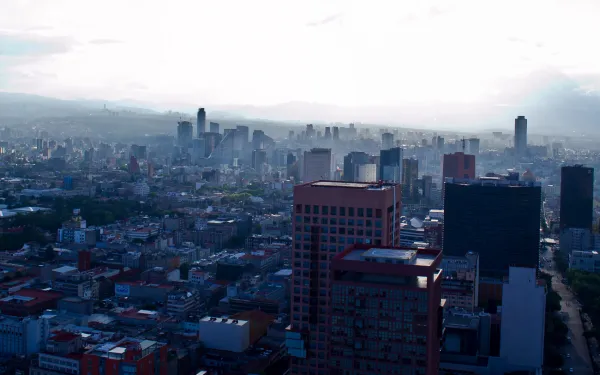
Contamination and COVID-19: Why didn't air quality Improve in the Valley of Mexico?
Measures adopted to deal with the global health pandemic caused by COVID-19 have led to a reduction in some atmospheric pollutants, which has considerably improved air quality in various cities around the world. Yet in the metropolitan area of the Valley of Mexico (MCMA)—which includes Mexico City and surrounding towns—air quality has not improved despite the suspension of activities associated with sources of pollution like traffic and industry. Months before the health emergency was declared in late March 2020, the air quality reported by the Valley’s Atmospheric Monitoring System was in the range of "regular" to "bad," due primarily to vehicle congestion. With restrictions on mobility established due to the pandemic, vehicle traffic decreased by up to 70% and, with it, so did some of the air pollution. According to official information, distancing measures caused a reduction in carbon monoxide and nitrogen oxides—of 58 and 32 percent, respectively. However, tropospheric ozone (O3), one of the most damaging pollutants to air quality and human health, did not decrease significantly (only 3 or 4 percent, according to official data). That’s why, in May, two months after measures were adopted to address the health crisis, air quality in the Valley of Mexico remained at the same parameters as the beginning of the year—that is, ranging from "regular" to "bad," according to the Atmospheric Monitoring System. The question that arises, then, is WHY? What causes air pollution? Various gases and compounds contaminate the air. Primary pollutants—like carbon dioxide (CO2), nitrogen oxides (NOx) and volatile organic compounds (VOC)—are directly discharged into the atmosphere. Secondary pollutants, like tropospheric ozone (O3), form in the atmosphere as a result of the chemical transformation of those primary pollutants. Tropospheric ozone is formed from the interaction of sunlight with "precursor gases," including volatile organic compounds and nitrogen oxides. Now, there are three factors that actually affect air quality: weather conditions, topography, and concentrations of one or more pollutants at levels that can harm the environment and human health. These concentrations are measured by official monitoring systems, like the MCMA Atmospheric Monitoring System. The World Health Organization establishes concentration levels of pollutants that should not be exceeded over a specific period. For tropospheric ozone, the recommended value is 50 parts per billion (ppb) over an eight-hour average. But Mexican regulations are more lax and establish a lower limit for this compound: a concentration less than or equal to 95 ppb on an hourly average (that is, in a 60-minute time interval). In addition, to activate an environmental contingency for ozone, concentrations must be greater than 154 ppb (hourly average). This standard implies less protection for the population's health. At the beginning of this year, the hourly ozone concentration in the Valley of Mexico averaged only 23 ppb, but it has risen since then. Despite the restrictions resulting from the health crisis, the average hourly concentration of ozone was 41 ppb in April and 45 ppb in May. Also, from January to May, 99 days were recorded in which ozone concentrations exceeded the 95 ppb limit. Why did concentrations of ozone increase? The restriction on mobility during the health contingency was not adequate to decrease concentrations of ozone in the atmosphere for two reasons: first, the sources of this compound are not limited to the use of vehicles; and second, the period of social isolation coincided with the so-called ozone season, a time of the year when the concentrations rise due to the increase of solar radiation and the decrease of rain and wind. As previously mentioned, tropospheric ozone is formed by the interaction of sunlight with precursor gases. Among these gases are nitrogen oxides—mainly generated by the combustion processes of automobiles, especially diesel engines—and volatile organic compounds, which arise from more diverse sources: the use of solvents, leaks of liquefied petroleum gas in heaters and stoves, cosmetic and cleaning products, and evaporated fuel in gas stations and automobiles without evaporative emissions control. According to official data, during social isolation, volatile organic compounds were only reduced by 15 percent, including all their emission sources. On the other hand are forest fires, a major source of ozone precursor gases. From January 1 to May 3 of this year, in Mexico City alone there were 644 forest fires— lower in number compared to the same period in 2019, but equally as intense. As for the ozone season, which begins the last week of February and ends with the first rains in June, the average temperature in the Valley of Mexico was higher this year. In April, it was 2°C higher than the average recorded in the same month between 1981 and 2010—the hottest April in recorded history. Because the temperature is directly related to solar radiation and lack of wind, its increase explains the higher ozone concentrations. The sum of these factors contributed to the fact that ozone concentrations actually increased despite the restrictions established by the pandemic. This, in turn, led to the residents of the Valley of Mexico continuing to experience poor air quality and suffering its negative health impacts. Why reducing ozone is good for public health and the climate Ozone not only affects air quality and thus public health. It also has the ability to absorb sunlight and heat the atmosphere, meaning it is a short-lived climate pollutant (SLCP). Because its emissions aggravate the climate crisis, more than 11,000 scientists from around the world have highlighted the need to reduce SLCPs in order to rapidly combat global warming. The intensity of the forest fires and the particularly high temperatures of this year's “ozone season” demonstrate the effects of the climate crisis that we are failing to adequately confront. That’s why it’s imperative that the government implement actions to reduce emissions of precursors gases—not only during the health emergency, but also when we get through it, when motorized transportation (a source of nitrogen oxides) is reactivated. Improved controls on the type of cars on the road, based on their polluting potential, and personal choices like biking, also recommended to reduce the risks of contagion, would help to achieve this objective, reduce global warming, and improve the health of those living in the Valley of Mexico. In addition, society must commit to measures of regulation, communication and education that curb consumer habits and improve on the production and distribution of goods and services that continue to emit volatile organic compounds (another ozone precursor) on a daily basis. Restricting the production and use of aerosol products, as well as repairing and preventing leaks of liquefied petroleum gas, would help to reduce these emissions. Finally, it’s necessary to strengthen the country's weak environmental policy and combat non-compliance with environmental health standards, which has resulted in an insufficient reduction in air pollution. Mexican air quality standards must be updated to set stricter limits that are compatible with international standards and the protection of the human right to health. The above are just some examples of actions that authorities and society can take to show that we have learned a lesson and will do what is necessary to improve air quality and face possible new health crises, as well as to combat the climate crisis that threatens to end the world as we know it today.
Read more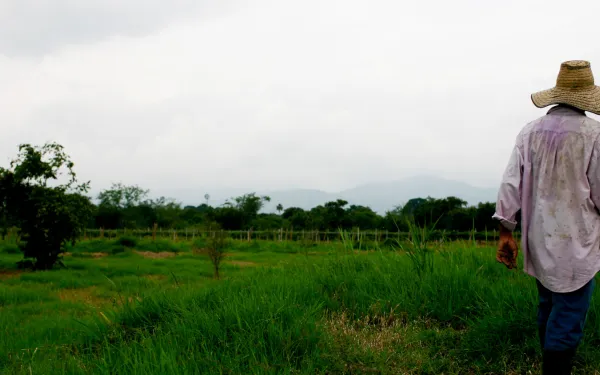
Protecting environmental defenders, a State duty that mustn’t be deferred
Every day men and women around the world dedicate their lives to protecting the ecosystems upon which entire communities and other living things depend. This work, essential for the protection of our planet, is carried out in legal, social, and political spheres. Unfortunately, those who defend the environment are victims of threats and assassinations. For many years now, Latin America has been the most dangerous region in the world to be an environmental defender, accounting for nearly 60 percent of these crimes. This, despite the fact that national and regional governments recognize human rights like free speech and a healthy environment, as well as the rights of nature. In 2019, Global Witness reported on the murder of 164 environmental defenders, many from Latin American nations—Colombia (24); Brazil (20); Guatemala (16) and Mexico (14). The report explained, “mining was the worst sector, causing 43 deaths, though deaths related to conflicts over water sources also surged. Attacks driven by agribusiness, logging and hydropower continued too.” In the context of the COVID-19 pandemic, the grave risk facing environmental defenders has not ceased. Despite social distancing and other measures adopted to slow the spread of the virus, violence aimed at defenders has continued. It is important to consider that the pandemic strains the networks of protections that exist to respond to emergencies, putting environmental defenders at increased risk. This, combined with the lack of will or ability for institutions to respond to any problems other than the current health crisis, makes for a complicated security situation. In effect, States must respect and guarantee human rights at all times. These are obligations that cannot be deferred, even in emergency situations, and must be emphasized and strengthened for those at risk, like environmental defenders. stATE’s Role as Protector The work of environmental defenders has been recognized within the international system of human rights as essential, in a democratic society, for strengthening the respect and enjoyment of other rights. The reality of the dangers with which these defenders live has been accompanied by a judicial evolution, as evidenced by international legal instruments such as the Escazu Agreement, which for the first time included environmental defenders as people subject to special protection. The Inter-American Court of Human Rights said that this type of protection is especially necessary due to the threats and intimidation defenders face. States have the obligation to: Avoid violating human rights and prevent others from doing so, something that applies to all people. Ensure a safe and conducive environment for environmental defenders to freely carry out their work, and therefore take special action to protect them when they are threatened; refrain from imposing obstacles that hinder the performance of their work; and seriously and effectively investigate violations committed against them. Ensure compliance with procedural rights in environmental matters, i.e. the right to information, public participation and access to justice. Refrain from acting in any way that encourages, stimulates, favors or deepens the vulnerability of these persons; and take necessary and reasonable measures to prevent or protect the rights of those who are in such a situation. This is relevant in the face of the increasing criminalization of human rights defenders by governments, who accuse them of "going against development" in a discourse that has wide reach. Conduct a prompt, serious, impartial and effective investigation into cases of violent death. Always include the perspective of women, since women defenders are exposed to higher levels of violence due to the context of pre-existing inequality. Finally, it’s important to highlight the need for all measures taken by States to clearly respect human rights and, at the same time, assure the life and integrity of environmental defenders as an indispensable element for climate justice and environmental democracy.
Read more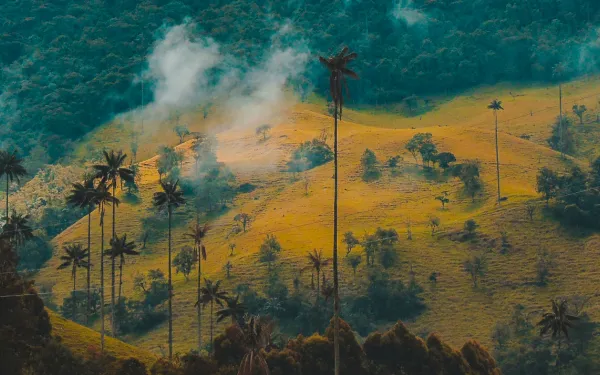
Colombia: Holding virtual hearings violates communities' right to participation
In the context of the pandemic, and since the beginning of Colombia's obligatory isolation, businessmen have asked the Colombian government to "simplify environmental procedures." On April 3, 25 entrepreneurs sent a letter to President Iván Duque asking for the simplification of processes including prior consultation, environmental licenses and royalities. One of the first measures undertaken was the attempt to simplify the prior consultation, proposing to make it virtual. In response, indigenous communities and the Ombudsman's Office requested that the Ministry of the Interior respect human rights and reverse the measure, which it did. However, the quest to change the way consultations are conducted continues. At the request of the Ministry of the Environment, the National Environmental Licensing Authority (ANLA) is promoting several virtual environmental hearings, even proposing they be held on radio and digital platforms such as Facebook and YouTube. These are hearings to address key environmental issues in the country. The problem is that communication on these platforms is unilateral, denounced the organization DeJusticia, thus eliminating the possibility of discussing technical issues, and presenting an obstacle for those with limited access to the Internet. On April 13, 2020, ANLA issued Resolution 642, which opened the way for virtual participation processes. Days later, the licensing authority scheduled a virtual hearing to discuss a very important issue for the region: the return of aerial spraying with glyphosate, a toxic herbicide. The hearing, scheduled for May 27, was intended to address the modification of the glyphosate environmental management plan. But, thanks to a legal action, on May 18 a judge from the department of Nariño suspended the hearing. As evidenced, there exists an ongoing intention to carry out similar proposals during the pandemic. Many have been halted by the early warnings of citizens, judicial actions or statements by control authorities. On 20 May, the Administrative Court of Santander ordered the Ministry of the Environment to plan virtual working groups. It has also called for a virtual public hearing on the Santurbán páramo, where a mega-mining project threatens to harm this strategic ecosystem, which is vital for local water supply and the mitigation of the climate crisis. Holding virtual hearings implies a damage to the rural, indigenous and urban communities affected by a project, and to Colombian society in general. In addition to being in the midst of the worst crisis in recent history, these communities lack access to the internet and the basic necessities that could guarantee their virtual participation. In Colombia, and across the region, the rights of access to information, justice and participation are among the most violated. We must stand at high alert so that the pandemic does not become an excuse to continue abusing them. All remaining proposed virtual proceedings must be immediately suspended, until there exists guarantees for the due exercise of the right to participation and the exercise of national and international oversight in these matters.
Read more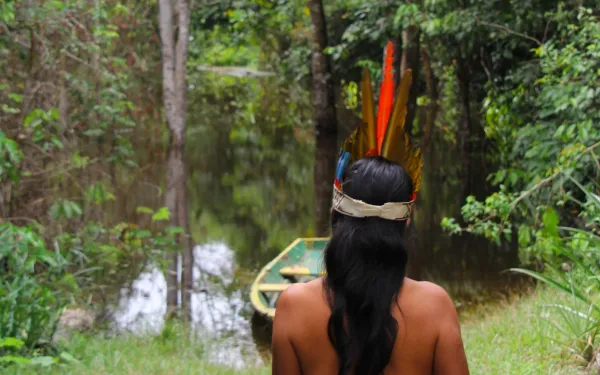
COVID-19 Response: The importance of providing special protection to indigenous peoples and Afro-descendants
Indigenous and afro-descendant peoples in Latin America and the Caribbean have been essential actors in the protection of nature, of key ecosystems and, in short, of the lives of all beings that inhabit the planet. At the same time, they have historically suffered discrimination, exclusion and the violation of their rights, seeing their survival threatened. According to the International Labor Organization’s report, Towards an Inclusive, Sustainable and Fair Future, Latin America is the region with the highest proportion of indigenous and tribal groups living in extreme poverty. In the context of global health crisis caused by the COVID-19 pandemic, the vulnerability of indigenous and afro-descendant peoples in the region has increased for at least three reasons. 1. The pandemic aggravates the lack of access of ethnic communities to their economic, social, cultural and environmental rights Both the United Nations and the Inter-American Human Rights System have drawn attention to the indivisibility and interdependence of all human rights. However, ethnic communities have historically faced the absence of guarantees for the enjoyment of their economic, social, cultural and environmental rights. Many of these peoples do not have effective access to health, sanitation and social security services. And due to deforestation and the advance of the agricultural frontier in their territories, they face increasing challenges in ensuring their food sovereignty, confronting new diseases, and adjusting their traditional medicine systems. In addition, several of them have serious problems accessing indispensable goods such as water and food. The barriers to accessing these services under quality conditions have become greater with the current health crisis, making these populations more vulnerable and putting their very survival at risk. This is an overwhelming reality for the region. In a recent statement, the Inter-American Commission on Human Rights (IACHR) expressed its concern by stating that, at the local level, "pandemic processes produce disproportionate impacts on populations with greater difficulties in accessing health structures and health care technologies within countries, such as indigenous peoples…” At the regional level, COICA (Coordinating Body of Indigenous Organizations of the Amazon Basin) declared a state of emergency in the face of the health crisis. In Guatemala, the International Commission of Jurists denounced that indigenous peoples "face the risk of suffering the destructive effects of the COVID-19 pandemic, due to historical and systematic discrimination against them" and that in the current crisis "they do not have access to clear and simple information on how to protect themselves from the pandemic and how to be protected during the emergency by the Health System." Indigenous leaders in Peru denounced food shortages and deficiencies in health care, calling for the supply of essential items in communities and the definition of protocols for carrying supplies. In Colombia, the National Indigenous Organization of Colombia (ONIC) reported that more than 191,000 indigenous families are at risk of infection and that for nearly 513,000 families the humanitarian crisis due to the pandemic is imminent. In addition, the National Conference of Afro-Colombian Organizations said that their population is at high risk and that "the majority of Afro-descendant territories do not have a network of equipment and personnel that would allow them to properly attend to potential affected persons." The situation in Brazil is the same. Out of 471 indigenous lands, 13 have critical vulnerability indexes regarding the pandemic. In the states of the Legal Amazon, 239 indigenous lands have intense or high vulnerability indexes. In general, the index varies between moderate, high, intense and critical. In addition, less than 10% of Brazilian municipalities with indigenous lands have beds available in the Intensive Care Unit and the indigenous health system only treats common diseases. Without guidance from the health departments, many indigenous groups are taking preventive measures on their own to prevent the pandemic from reaching their territories. Such measures include voluntary isolation, hygiene campaigns, and suspension of large mobilizations, events and travel; there has even been a closure of traffic between villages to prevent the spread of the disease. 2. Ethnic communities require differentiated measures, but the response of States remains insufficient In various countries of the region, indigenous communities are reporting that the measures taken by authorities in response to the pandemic have been precarious and culturally inadequate because they do not consider the uses and customs of these peoples. The IACHR and the Rapporteurship on Economic, Social, Cultural, and Environmental Rights have reiterated that States must adopt culturally appropriate, timely, and effective responses to guarantee the rights of indigenous peoples in the face of the pandemic. The IACHR reminded States of their obligation to provide "special protection" to the indigenous population, as well as " the importance of providing them clear information about the pandemic in their traditional language, whenever possible.” It also referred to Afro-descendant and tribal communities, highlighting the need for their situation “to be made visible in the context of this pandemic, especially to include an ethnic-racial perspective with an intersectional approach in all response measures implemented both in the level national, as in the regional responses that can be articulated.” In Mexico, the Mayan Community Collective of Hopelchén publicly denounced the Mexican government for the lack of implementation of an official strategy to inform Mayan indigenous peoples about the risks they face in the face of the health crisis. In Ecuador, the WHO warned of the lack of protocols for indigenous peoples and nationalities in the face of the pandemic. It noted that it is essential that social food programs reach these communities and the rural sector, and that prevention campaigns reach them in their own languages. The situation is aggravated by the poor connectivity of many of these peoples, who lack land, air and/or river routes. This hinders their mobility and access to social services, the internet and information about the pandemic, including state measures taken and self-care actions to be implemented. 3. The territorial rights of indigenous and Afro-descendant communities continue to be violated In the midst of the sanitary emergency and the confinement decreed in several countries of the region, governments and other actors have adopted measures or promoted initiatives that ignore the right to prior consultation, cause the relaxation of environmental requirements for high-impact development projects, and favor the lack of effective guarantees for citizen participation in environmental matters. In Colombia, the national government promoted virtual prior consultations. The National Commission on Indigenous Territories and several human rights organizations rejected the initiative, which was finally repealed. However, concern persists over the request made by businesspeople to the government for the relaxation of environmental permits in the country, a vital instrument for protecting the environment and indigenous territories. In Brazil, the pandemic's threats to indigenous communities are compounded by the invasion of indigenous territories and increased violence and threats to their leaders. In Roraima, Mato Grosso and Bahia, indigenous peoples blocked roads and built barriers to prevent invaders from entering their lands. These risks also come from the State. The National Indian Foundation (FUNAI) published an administrative act promoting the recognition of boundaries of private property on indigenous lands. This is intended to allow the issuance of property titles to invaders on indigenous lands, legitimizing their actions. In Mexico, organizations and communities denounced the federal government’s continuation of the so-called "Mayan train" project despite the fact that its construction is non-essential in the context of the pandemic. The project puts at risk the population in charge of its construction and prevents access to information and justice for communities given the suspension of deadlines in state institutions and the impossibility of resorting to appropriate judicial mechanisms. In Bolivia, the National Coordinator for the Defense of Indigenous and Peasant Territories and Protected Areas stated that indigenous peoples are vulnerable not only to the coronavirus, but also to what will come next: "a big hole in the global economy" and, therefore, "an excuse for more attacks on nature, indigenous territories and the natural protected areas where they are located.” On this issue, the IACHR reiterated to the States " the importance of recognizing the territorial rights of collective property to the Afro-descendant communities and guaranteeing them the effective right to free, prior and informed consent and consultation, respecting their free self-determination.” It also urged States to " refrain from promoting legislative initiatives or projects that affect ethnic territories during the duration of this pandemic, due to the impossibility of carrying out said consultation processes.” Towards emergency health care that respects the rights of indigenous peoples and people of African descent Indigenous peoples and people of African descent represent one of the continent's most important assets. Their millenary residence and their worldview—which respects nature and the beings that inhabit it—have been and are an invaluable legacy. They will be an indispensable element in promoting reflections on the global health and ecological crises that we face. The contributions of ethnic communities and their ancestral knowledge, which have transcended time and contributed to the survival of the planet, are essential for the implementation of preventative and care measures related to the pandemic. This is what the President of the Permanent Forum on Indigenous Issues emphasized: “Indigenous peoples can contribute to seeking solutions. Their good practices of traditional healing and knowledge, such as sealing off communities to prevent the spread of diseases and of voluntary isolation, are being followed throughout the world today.” Protecting these peoples so that the pandemic does not threaten their lives and integrity is a moral and historic duty, and an international obligation of all States. It is therefore imperative that States: Promote special care plans and emergency protocols for ethnic communities and other vulnerable populations, with a human rights approach and from a differential perspective. Support the initiatives that some Afro-descendent peoples and indigenous communities have taken to deal with the crisis of the pandemic on the basis of self-government and autonomy, including strategies of voluntary isolation, the use of traditional medicine and the conduct of internal information and communication campaigns. Refrain from promoting measures that disregard the territorial rights of indigenous peoples and people of African descent. AIDA urged States to suspend the approval of environmental and other official permits for sensitive projects unrelated to the response to the health crisis, until human rights can be adequately guaranteed. Suspend prior consultations until conditions are in place to guarantee the rights of indigenous peoples. Suspend bills and initiatives that weaken the integrity of indigenous territories, as well as the progress of any development project or extractive activity on indigenous or Afro-descendant lands that could have negative effects on the life or integrity of these peoples.
Read more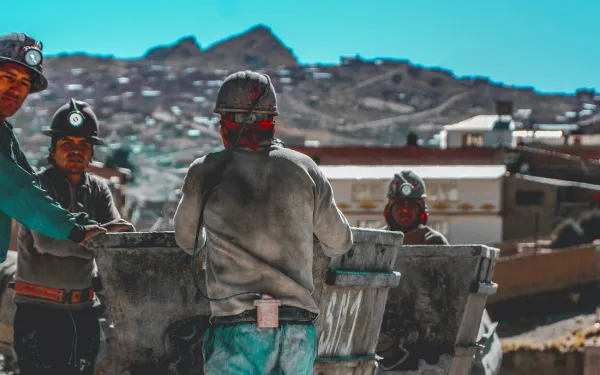
Webinar "A Just Transition: Why should industrialized countries reduce their consumption of raw materials? The case of Germany"
The global expansion of renewable energies, electric mobility and digitalization will massively increase the demand for raw materials. This implies the risk of damage to human rights and the environment, as well as an intensification of geopolitical tensions over these resources. In this context, a globally inequitable distribution of raw material consumption would jeopardize the sustainable and fair development of the countries of the Global South.In this webinar, we presented the proposals of an NGO network in Germany to achieve a reduction in the consumption of raw materials and to include the perspectives of producer countries, supporting their call for a "change in raw materials" (Rohstoffwende). PanelistRebecca Heinz: Policy Advisor – Resource Policy at Germanwatch. Recording Presentations1. Opening presentation: 2. Presentation of Rebecca Heinz, Germanwatch: Additional materialGermanwatch report 12 Reasons for a Primary Resource Transition(in German) More informationTo learn more about the just transition proposal presented at the seminar, write to [email protected]
Read more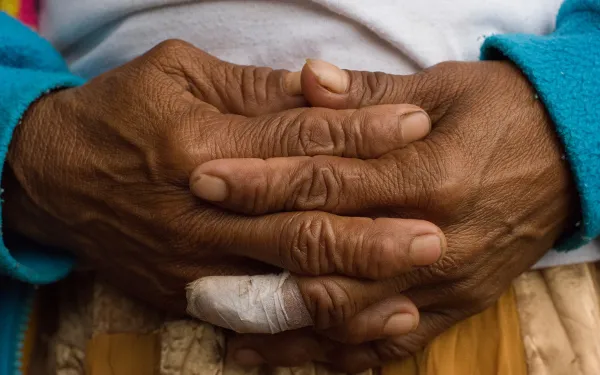
Inter-American Court upholds indigenous rights in Argentina
In Argentina’s Rivadavia department, along the border of Bolivia and Paraguay, the lands have been inhabited by indigenous people for at least 60 years. Communities there subsist primarily from hunting, gathering, and fishing. Many of these ancestral peoples have been battling for governmental recognition of their land rights since 1984, when the country’s transition from dictatorship to democracy began. This lack of recognition has had profound impacts on the lives of indigenous inhabitants, affected by changes in their land and its use. As Creole families settled in the area, they brought their own customs and economic activities, such as animal grazing and illegal logging. Barbed wire fence was erected without consulting indigenous populations, and an international bridge was built that crosses into their land. These developments have changed how the indigenous people eat and disrupted their access to water, threatening their very cultural identity. With no protection from the Argentine government, in 1998 a coalition of indigenous groups took their struggle before the Inter-American Commission on Human Rights. Grouped in the Lhaka Honhat (Nuestra Tierra) Association—made up of Wichí (Mataco), Iyjwaja (Chorote), Komlek (Toba), Niwackle (Chulupí) and Tapy'y (Tapiete) indigenous peoples—, they were represented by the Centre for Legal and Social Studies. In 2012, the Commission issued its Merits Report, establishing the violation of indigenous communities' rights and recommending that the State adopt reparation measures. When Argentina failed to comply with the provision, the case was referred to the Inter-American Court of Human Rights. On April 2, 2020, the Court’s decision declared Argentina responsible for the violation of the indigenous peoples’ rights to community property, cultural identity, a healthy environment, and adequate food and water. The ruling marks an important milestone in the struggle for indigenous rights. It is the first time that the Court, in a contentious case, has analyzed these rights autonomously on the basis of Article 26 of the American Convention, and ordered specific measures for their restitution, including actions for access to food and water, the recovery of forest resources, and the recovery of indigenous culture. Actions for Reparation Among other implications, the Court's decision could lead to solutions to the health issues afflicting the indigenous communities of Lhaka Honhat. The violation of their rights to food and water has caused deaths from malnutrition and dehydration. The Court demanded that the State present a study within six months that identifies critical situations of lack of access to drinking water and food, formulates a plan of action to address them, and begins its implementation. It also ordered the creation and implementation of a community development fund within a period of no more than four years. As for the territory, the State shall, within a maximum period of six years: Delineate, demarcate, and grant a single collective title without subdivisions or fragmentations for the indigenous communities. Transfer the Creole population out of the indigenous territory through specific mechanisms that promote, above all, voluntary transfer. Remove barbed wire fences and livestock belonging to Creole settlers from indigenous lands. Refrain from carrying out acts, works or undertakings in indigenous territory. Additionally, the Court requested the adoption of legislative and/or other measures to provide legal certainty to the right to indigenous community property in Argentina. Supporting the Indigenous Struggle In March 2019, AIDA helped author and amicus brief in support of the climate of the indigenous communities of the Lhaka Honhat Association. We did so alongside our allies on the litigation group of the International Network for Economic, Social and Cultural Rights (ESCR-Net), including Amnesty International, the Asociación Civil por Igualdad y Justicia, the Colombian Commission of Jurists, Dejusticia, FIAN International, International Women's Rights Action Watch - Asia Pacific, and the Minority Rights Group International. Our arguments highlighted the importance of recognizing economic, social, cultural, and environmental rights as real enforceable rights—similar to others such as the right to life or personal integrity—due to their independent and indivisible nature. In this sense, AIDA recalled the important advance that the Court promoted with Advisory Opinion 023, which recognizes the right to a healthy environment as fundamental to human life. Our brief called on the government to respect the rights of indigenous peoples—as outlined in Article 26 of the American Convention on Human Rights—to a healthy environment, food and water, and cultural identity. The Court's decision establishes an important regional precedent for the protection of the environment in the Americas. It contributes to the consolidation of standards to protect the land of indigenous communities, as well as their rights to a healthy environment, water and culture.
Read more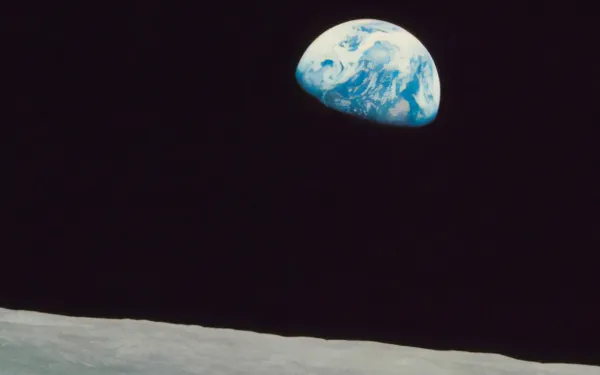
International Environmental Law: History and milestones
International Environmental Law (IEL) is a discipline that involves the whole world in the protection of a common good: our environment. At AIDA, we apply it every day to help individuals and communities defend the environment and the fundamental human rights that depend on it. But where did this global discipline come from and how has it evolved? Its rules have not been dictated by a national institution or an international authority. Rather, it is a compendium of declarations, treaties and rules—some binding, some voluntary—that have developed alongside scientific knowledge and awareness of the current state of our natural world. The history of IEL can be divided into three stages, separated by two of the most relevant international conferences held so far: the Stockholm Conference (1972) and the Rio de Janeiro Earth Summit (1992). And in 2016, with the signing of the Paris Agreement, a new stage began to confront humanity's most important natural challenge: the current climate emergency. The beginnings: Before Stockholm Before the 1960s, there was little environmental awareness and only a few isolated international environmental regulatory initiatives. One of these was the failed London Convention of 1900, which sought to protect African wildlife. It never came into force because it was not signed by the minimum number of parties. It was replaced 33 years later by the 1933 London Convention, which was implemented in much of colonized Africa through the creation of nature parks and species protection. During those years, other initiatives were carried out in isolation. But things really started to change in the 1960s, when public opinion became aware of the dangers threatening the planet. Some of the events that marked this era were the publication in 1962 of the book Silent Spring by Rachel Carson, which documented the negative effects of pesticides on birds and the environment; and the release of the image known as Earthrise, taken by astronaut William Anders in 1968 during the Apollo 8 mission. The Stockholm Declaration A product of the first UN Conference on the Human Environment, the Stockholm Declaration (1972) was the first international document to recognize the right to a healthy environment through 26 principles, many of which have played an important role in the subsequent development of IEL. Principle 21, for example, confirmed one of the cornerstones of IEL: the responsibility of States to ensure that activities under their jurisdiction do not cause damage to the environment of other States. The Declaration also established the Principle of Cooperation, which is crucial in the further development of IEL, by recognizing that countries should unite their efforts to meet the global challenges of our shared environment. Also in Stockholm, the UN General Assembly created the United Nations Environment Programme (UNEP), the central body in charge of environmental affairs today. Between Stockholm and Rio After Stockholm, changes began to be seen in national governments: the first green political parties were formed, some Ministries of Environment were created, and a significant amount of local environmental legislation began to be developed. In 1983, the UN created the World Commission on Environment and Development, known as the Brundtland Commission. Its work, which focused on the difficult relationship between environment and development, resulted in the report Our Common Future (1987). That document coined the concept of sustainable development - defined as "meeting the needs of the present generation without compromising the ability of future generations to meet their own needs" - which is the basis for the evolution of IEL. At this time, some of the global environmental problems that still afflict us today began to manifest themselves--including the depletion of the ozone layer, risks to biological diversity, and the threat of climate change. International cooperation was absolutely necessary and developed countries would have to help poorer countries if humanity was to be able to meet such challenges. In 1987, the Montreal Protocol was signed to combat the depletion of the ozone layer. This international agreement has been an example of successful international cooperation.Because of it, it’s believed that the ozone layer could recover by 2050. The Earth Summit in Rio de Janeiro In 1992, during this Conference, two conventions were presented to be signed by national governments: the Convention on Biological Diversity and the United Nations Framework Convention on Climate Change (UNFCCC). The Rio Declaration was also established, which reaffirmed the Stockholm Declaration and the Agenda 21 action program, which continues to guide governments and non-state actors in environmental protection activities. In Rio, in the face of growing evidence that human activities in pursuit of economic growth were responsible for major environmental threats, the central concept continued to be sustainable development. Two principles of the Rio Declaration deserve special consideration: the Precautionary Principle, the most advanced form of prevention and important to the formation of modern IEL; and Principle 10, which recognizes the right to information, participation, and justice in environmental matters. In 1998 Principle 10 gave rise to the Aarhus Convention, binding in Europe and Central Asia. The Aarhus Convention is the predecessor of the Escazú Agreement, which seeks recognition of these rights in Latin America. This recognition is also considered an important milestone in the creation of IEL because it shows the emergence of civil society as an increasingly important and active player in global environmental protection. After Rio and into the Future After Rio, all major economic treaties began to include environmental protection. A case in point is the Marrakech Agreement, which created the World Trade Organization in 1994 and was the first economic treaty to recognize the goals of sustainable development and environmental protection. The Convention on Climate Change of 1995 deserves special mention, since its signatories have met every year at the so-called Conference of the Parties (COP). Within this framework, in 1997, the Kyoto Protocol was presented. Despite not having been successful in mitigating greenhouse gas emissions, it was the first international agreement to establish legally binding obligations for developed countries. In 2000, 189 countries adopted the Millennium Declaration in New York, which strengthened the importance of sustainable development by recognizing the need for sustainable economic growth with a focus on the poor and respect for human rights. Two years later, in 2002, representatives from 190 countries attended the UN World Summit on Sustainable Development in Johannesburg to follow up on the commitments of the Rio Summit. On that occasion, they adopted the Declaration on Sustainable Development, which focused on development and poverty eradication with a legal-economic approach on "public-private partnerships”. And in 2012, the UN organized the third Conference on Sustainable Development, known as Rio + 20, which brought together 192 Member States, private sector companies, NGOs, and other organizations. The result was a non-binding document called The Future We Want. In the document, States renewed their commitment to sustainable development and the promotion of a sustainable future. Modern Times The Kyoto Protocol to address climate change gave way to the Paris Agreement (2016). In this agreement, the signatory countries committed themselves to doing everything possible to prevent the average temperature of the planet from rising by 2°C, compared to pre-industrial levels, and hopefully staying below a 1.5°C rise. The relationship between human rights and climate change was recognized in its preamble. Having been ratified by almost all countries in the world, it has immense potential as an instrument of international law. In fact, recently the first ruling that prevented a project (the expansion of an airport) was made in England, on the grounds that by proceeding the country would not be complying with the Paris Agreement. A contemporary landmark of great relevance, especially for Latin America, is Advisory Opinion 23 (2017) on the environment and human rights of the Inter-American Court of Human Rights. In it, the Court recognized for the first time the right to a healthy environment as fundamental to human existence, as well as the impacts of environmental degradation and climate change on human rights. Finally, it is worth mentioning the current construction of an international legally binding instrument for the conservation and sustainable use of marine biological diversity in areas beyond national jurisdiction. In recognition of the crucial role that the ocean plays in the health of the planet and especially in the stability of the climate, safeguarding the vast and mysterious areas in the high seas seems to be absolutely necessary. Conclusion: Where do we stand? After reviewing the most important milestones related to global efforts to address the serious environmental crisis we are experiencing, it is inevitable that we will be plunged into deep concern. Global initiatives have not succeeded in motivating the change of direction we need for our planet to begin to regain its health. As it stands, no one can ensure that future generations will be able to meet their needs as past and present generations have done. Despite the disappointments, it is important to continue promoting global initiatives where common policies are discussed and where IEL takes shape. Although these initiatives have not yet been able to stop the environmental crisis, they have strengthened IEL as an instrument to defend our causes, something that we make the most of at AIDA. Likewise, world conferences often become platforms for large-scale protests and awareness-raising campaigns directed by global civil society, which has become increasingly alert and determined to defend our environment. Today, much of the hope for change lies in the strength of civil society, especially in the young people who have awakened and come to the defense of the planet. This force finds in IEL a point of support to demand what we need: a resounding change in the model of development that still guides the affairs of the planet, and which is causing so much damage.
Read more